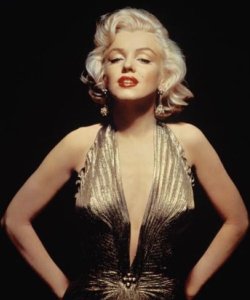 Few stars have had such an impact on pop culture, yet there is a strange mixed appraisal of her work. She was mesmerizing on screen, with great comic timing, substantial dramatic chops, unlimited charisma, and a pleasing and memorable singing voice. And, of course, she was breathtakingly beautiful. She was also exceptionally sexy, and neither film critics nor the public at large have ever become comfortable with pure sex appeal. Many denigrated her during her career, discounting her talent and skill. She was never given the accolades she deserved, but while others picked up the Oscars that should have been hers, she is the one that will be remembered.
Few stars have had such an impact on pop culture, yet there is a strange mixed appraisal of her work. She was mesmerizing on screen, with great comic timing, substantial dramatic chops, unlimited charisma, and a pleasing and memorable singing voice. And, of course, she was breathtakingly beautiful. She was also exceptionally sexy, and neither film critics nor the public at large have ever become comfortable with pure sex appeal. Many denigrated her during her career, discounting her talent and skill. She was never given the accolades she deserved, but while others picked up the Oscars that should have been hers, she is the one that will be remembered.
While critics complain that many of her roles were similar, that’s true of most movie stars. Bogart, Cagney, Davis, Grant, Pacino, and De Niro are all known for taking specific types of roles. What’s important is how well they perform those parts, and Monroe was exquisite. Unfortunately her horrendous childhood caught up with her, leading her into depression, addiction, and death at 36.
First, a few honorable mentions. One goes to the anthology film O. Henry’s Full House (1952) where she has a cameo as a streetwalker. She’s wonderful, as is Charles Laughton who is trying to get arrested as a masher. And another for Ladies of the Chorus (1948), Monroe’s first credited appearance. The film is so-so and occasionally exasperating, but the youthful Monroe is stunning and her songs—sung with a far less breathy voice than she’d adopt later—are charming.
As for dishonorable mentions, I’ll only bring up one: The Misfits. This isn’t a negative comment on her, as she is by far the best thing in the film. Nor is The Misfits the worst film she’d been in, not with the abysmal Let’s Make Love or the sleep-inducing The Prince and the Showgirl hanging about. But everyone knows those are terrible while The Misfits occasionally gets positive reviews for no good reason (My full review).
Her top 8:
#8 – As Young as You Feel (1951) — Monroe has a minor role as a secretary. The film belongs to Monty Woolley, whose character is forced to retire due to his age, so masquerades as the boss’s boss in order to change the company’s rules. The script by Paddy Chayefsky slips in some social commentary, and Woolley’s part of the film is good, though some side business with his family is tiring. Monroe doesn’t have enough time to steal the film, but she controls every frame she’s in.
#7 – The Asphalt Jungle (1950) — John Huston’s second Noir (after The Maltese Falcon) paints a world of disease and hopelessness. Monroe had a small part as the one thing in that world that is worthwhile. Joseph Mankiewicz saw her in this, and cast her in a supporting role in his masterpiece, All About Eve. (My Full Review) [Also on the Best Directors List for John Huston]
#6 – How to Marry a Millionaire (1953) — A constantly amusing comedy of three girls looking for millionaire husbands, it was planned as a showcase firstly for long reigning sex queen Betty Grable (who got top billing), then secondly for Lauren Bacall, and finally for newcomer Monroe, but by the time the film came out, Monroe was the new queen. The other two took being upstaged very well, and both were helpful and kind to the insecure Monroe. [Also on the William Powell list]
#5 – Don’t Bother to Knock (1952) — A tense and effective Noir that gets very little notice now. It was Monroe’s first leading role and showed she could play drama. (My Full Review)
#4 – The Seven Year Itch (1955) — Perhaps the perfect sex comedy (cleaned up for ‘50s morality), it’s a witty farce where a married man, left alone for the summer, fantasizes about the bombshell who moves in upstairs. Monroe agreed to appear in the weak There’s No Business Like Show Business in exchange for getting this part. [Also the Great Directors List for Billy Wilder]
#3 – Gentlemen Prefer Blondes (1953) — You can spend days analyzing the subtext of this Jane Russell/Marilyn Monroe musical, which ends with Monroe’s Lorelei Lee giving a defense of gold digging that is impossible to refute. The Diamonds Are A Girl’s Best Friend number has become iconic. [Also on the Great Directors List for Howard Hawks]
#2 – All About Eve (1950) — With the exception of Monroe, this was the best film for everyone connected with it. Bette Davis is at her most Bette Davis-ish, playing the ultimate diva being replaced by the conniving Eve (Anne Baxter), all under the watchful eye of the poisonous theater critic Addison DeWitt (George Sanders). Monroe’s in a supporting role, as a young actress in DeWitt’s care. It’s a melodrama and melodrama has never been better.
#1 – Some Like It Hot (1959) — Tony Curtis and Jack Lemmon hide out in a women’s jazz band, with Monroe as the singer. Often cited as the greatest comedy of all time, it is certainly a contender, and my pick as the best film of 1959. It’s a buddy, drag, romantic comedy with gangsters and music. What’s not to love? [Also on the Jack Lemmon List, and on the Great Directors List for Billy Wilder]